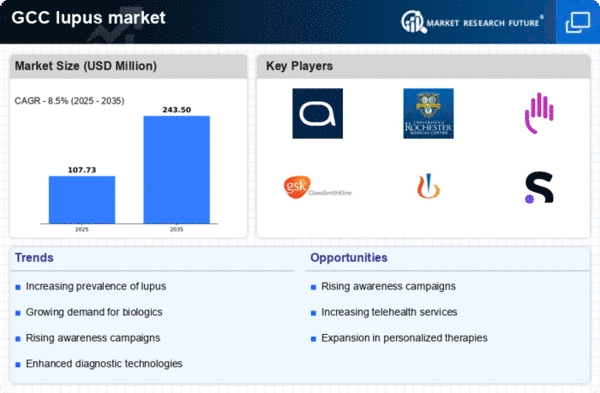Rising Healthcare Expenditure
The increasing healthcare expenditure in the GCC region is a pivotal driver for the lupus market. As countries in the region invest more in healthcare, the availability of advanced medical technologies and treatment options is likely to improve. Reports indicate that healthcare spending in the GCC is projected to reach approximately $100 billion by 2025, which could significantly impact the lupus market. This rise in expenditure may facilitate the development of new therapies and diagnostic tools, enhancing the overall quality of care for lupus patients. Furthermore, increased funding for healthcare services can lead to better access to medications and treatment options, thereby supporting market growth. As healthcare budgets expand, the lupus market is expected to thrive, driven by improved patient care and innovative solutions.
Increasing Prevalence of Lupus
The rising incidence of lupus in the GCC region is a crucial driver for the lupus market. Recent studies indicate that the prevalence of lupus is increasing, with estimates suggesting that around 5 in 100,000 individuals are affected. This growing patient population necessitates enhanced healthcare services and treatment options, thereby expanding the market. The lupus market is likely to experience growth as healthcare providers focus on developing targeted therapies and improving patient management strategies. Furthermore, the increasing number of diagnosed cases may lead to heightened demand for diagnostic tools and medications, which could further stimulate market expansion. As awareness of lupus continues to grow, the healthcare system in the GCC is expected to adapt, leading to a more robust lupus market.
Enhanced Diagnostic Technologies
Advancements in diagnostic technologies are significantly influencing the lupus market. The development of more accurate and efficient diagnostic tools is crucial for early detection and management of lupus. In the GCC, the introduction of innovative diagnostic methods, such as biomarker testing and advanced imaging techniques, is likely to improve patient outcomes. These technologies enable healthcare professionals to diagnose lupus more accurately and monitor disease progression effectively. As the demand for precise diagnostics increases, the lupus market is expected to expand, driven by the need for better patient management solutions. Furthermore, the integration of artificial intelligence in diagnostics may enhance the speed and accuracy of lupus detection, potentially revolutionizing the market landscape.
Government Initiatives and Funding
Government initiatives aimed at improving healthcare infrastructure and funding for lupus research play a significant role in shaping the lupus market. In the GCC, various health ministries are allocating resources to combat chronic diseases, including lupus. For instance, increased funding for research and development can lead to innovative treatment options and better patient care. The commitment of governments to enhance healthcare services may result in the establishment of specialized lupus clinics and support programs, which could improve patient outcomes. Additionally, public health campaigns aimed at raising awareness about lupus can lead to earlier diagnosis and treatment, further driving the lupus market. As governments prioritize chronic disease management, the lupus market is likely to benefit from enhanced support and resources.
Growing Demand for Personalized Medicine
The trend towards personalized medicine is emerging as a key driver in the lupus market. Patients are increasingly seeking tailored treatment options that cater to their specific genetic and environmental factors. This shift is prompting pharmaceutical companies to invest in research and development of personalized therapies for lupus. The GCC region is witnessing a growing interest in precision medicine, which could lead to the introduction of targeted therapies that are more effective and have fewer side effects. As healthcare providers adopt personalized approaches, the lupus market may experience a transformation, with an emphasis on individualized treatment plans. This trend not only enhances patient satisfaction but also has the potential to improve clinical outcomes, thereby driving market growth.
















